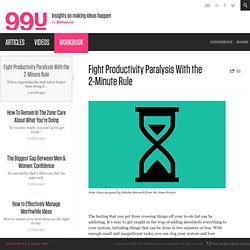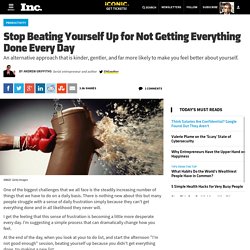

Learning and Concentration. Willpower. Growth Mindset. To Anyone Who Thinks They're Falling Behind In Life. You don’t need more motivation.

You don’t need to be inspired to action. You don’t need to read any more lists and posts about how you’re not doing enough. We act as if we can read enough articles and enough little Pinterest quotes and suddenly the little switch in our brain will put us into action. But, honestly, here’s the thing that nobody really talks about when it comes to success and motivation and willpower and goals and productivity and all those little buzzwords that have come into popularity: you are as you are until you’re not. How Clutter Affects Your Brain (and What You Can Do About It)
Fight Productivity Paralysis With the 2-Minute Rule. Superhero designed by Moriah Rich from the Noun Project Being in the zone means that you’ve become so absorbed in the activity at hand that it’s impossible to concentrate on anything else.

It’s when code seems to flow from your fingertips, when words seem to fly out of your pen, and when your stylus seems to take on a life of its own. But a common misconception about the zone is that it’s some some elusive, magical place. It is not. The founder of the language training app Yakk, Martin Rue, has a simple two-step process for tapping into, and remaining in, the zone: 1) Give a shit about what you’re doing.
There are several factors that influence our ability to get into the zone, chief among which are focus, energy, no distractions and music. Read the rest of Rue’s blog post on how to remain in the zone here. Related: Not Too Hard, Not Too Easy: Finding Flow In Your Work. 5 Routines To Clear Mental Clutter. That smartphone in your pocket?

It’s nearly doubling the amount of time you spend working. A 2013 survey by the Center for Creative Leadership found that the typical smartphone-carrying professional interacts with work an average of 72 hours a week. No wonder we’re all so stressed out. "Year after year, people complain of being more overwhelmed than they were the year before," says Scott Eblin, author of Overworked and Overwhelmed: The Mindfulness Alternative "It’s an epidemic that needs to be addressed.
" It started during the financial crisis of 2008, says Eblin. For Eblin, an executive coach and president of the Eblin Group, the impact of stress hit home in 2009 when he was diagnosed with multiple sclerosis. "Managing MS is about managing stress," he says. The entry point to mindfulness is awareness, but Eblin says the endless amount of distractions in today’s world makes it difficult. The opposite of fight or flight is "rest and digest.
" 1. 2. What was supposed to happen? 3. 4. 5. Habit Hack: The Science Behind How A Habit Is Formed. “Starting next month, I will run three times a week” “After Christmas, I will only eat ice cream once a week maximum”

How to Debug Your Brain and Build Better Habits. Stop Beating Yourself Up for Not Getting Everything Done Every Day. One of the biggest challenges that we all face is the steadily increasing number of things that we have to do on a daily basis.

There is nothing new about this but many people struggle with a sense of daily frustration simply because they can't get everything done and in all likelihood they never will. I get the feeling that this sense of frustration is becoming a little more desperate every day. I'm suggesting a simple process that can dramatically change how you feel. At the end of the day, when you look at your to do list, and start the afternoon "I'm not good enough" session, beating yourself up because you didn't get everything done, try making a new list. On this list, jot down a few bullet points for each of the following 5 questions? 1. Now don't just give them a cursory glance, actually read through the list of things that you were able to cross off and give yourself a pat on the back for getting them done. 2. 3. 4. Being Too Hard on Yourself Creates a Dangerous Feedback Loop. By Robert Montenegro Self-sabotage is a fascinating topic.

Philosophically speaking, the impetus for every human action is the pursuit of some form of happiness. Why, then, do so many people purposely handicap themselves when striving for goals? What pushes someone to believe they don't deserve and therefore shouldn't have happiness? Most research on this subject points to self-esteem. There's also the fact that, in any hero's journey, failure is part of growth.
Over at The Huffington Post, author Margie Warrell promotes her new book Brave with an article on why it's so important not to be so hard on yourself: "The negative emotions we create by being overly hard on ourselves not only erode our happiness, but change our physiology. Top 10 Uncomfortable Situations and How to Deal with Them. Why Stress Makes It Difficult to Change a Habit. When Getting Angry Is the Most Rational Thing to Do. How to Manage Your Seething Rage Productively.